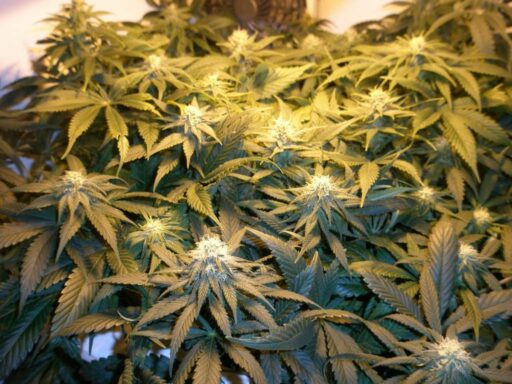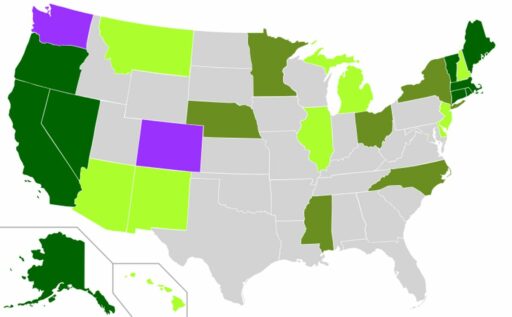The legal landscape of marijuana in Alabama is complex and ever-changing. This article aims to provide a comprehensive understanding of the current marijuana laws in Alabama, including the status of recreational and medical cannabis, as well as hemp-derived THC products. It will also delve into the medical marijuana program, the consequences of possession and cultivation, and the legal implications for consumers and businesses. Additionally, the article will explore future prospects and the political climate surrounding cannabis legislation in the state.
Key Takeaways
- Recreational marijuana is illegal in Alabama, with first-time possession being a misdemeanor and repeat offenses or intent to sell resulting in felonies.
- Medical marijuana is legal in Alabama for treatment of qualifying conditions, but the program faces delays as dispensary licenses are blocked by legislators.
- Hemp-derived THC products, such as Delta 8 and Delta 10 THC, are legal in Alabama, offering an alternative to consumers.
- Cultivation of marijuana for personal use remains illegal, highlighting the strict stance the state takes on cannabis production.
- Legislative efforts are underway to address challenges within Alabama’s medical marijuana program, including expanding the number of licenses and improving patient access in healthcare facilities.
Overview of Marijuana Legality in Alabama

Recreational Marijuana: Legal Status
In Alabama, recreational marijuana remains illegal. Possession and use of marijuana for non-medical purposes are not permitted under state law. Alabama has not followed the trend of many other states in legalizing recreational marijuana.
Despite the growing number of states legalizing cannabis for recreational use, Alabama maintains strict regulations against it. This contrasts with the state’s stance on medical marijuana, which, under certain conditions, is accessible to qualifying patients.
While some states have decriminalized possession of small amounts of marijuana, Alabama continues to enforce penalties for possession, reflecting a more conservative approach to cannabis legislation.
It’s important for residents and visitors to be aware of these laws to avoid legal repercussions. Here is a brief overview of the legal status in Alabama:
- Recreational marijuana: Illegal
- Medical marijuana: Legal with restrictions
- Hemp-derived THC products: Legal under the 2018 Farm Bill
Medical Marijuana: Access and Regulations
In Alabama, access to medical marijuana is strictly regulated and requires a written recommendation from a licensed healthcare provider. Patients must qualify with certain medical conditions to be eligible for a medical cannabis card. The state has outlined specific chronic and mental health conditions that allow for treatment with medical marijuana.
- Qualifying Conditions: Include certain chronic medical conditions and mental health disorders.
- Obtaining Medical Marijuana: Patients must secure a medical marijuana license or card after consultation with healthcare providers.
- Patient Rights: Include confidentiality of status, protection through consumer guidelines, and the right to choose from quality-controlled products.
The process of obtaining medical marijuana in Alabama is designed to ensure that only those with qualifying conditions have access to cannabis for therapeutic purposes. This system aims to provide safe and controlled access while complying with state laws.
Hemp-Derived THC Products: Legality and Availability
Following the 2018 Agricultural Improvement Act, hemp-derived cannabis products containing less than 0.3% delta-9 THC became legal at the federal level. This has led to the widespread marketing of hemp-derived delta-8 products, which are often available as edibles or vapes. However, the regulation of these products remains a concern.
In Alabama, hemp-derived THC products such as Delta 8 and Delta 10 THC are legal. This includes various THC isomers derived from hemp, aligning with federal law. Yet, the state faces challenges due to the unregulated nature of these products, which can lead to health risks.
The potency and safety of these products are often unknown, as they are not subject to stringent regulatory oversight. Preliminary studies have indicated potential adverse health effects from the use of delta-8 products, including respiratory and psychological issues. Consumers should exercise caution and stay informed about the products they choose to use.
Understanding Alabama’s Medical Marijuana Program

Qualifying Conditions and Patient Eligibility
In Alabama, the eligibility for medical marijuana is strictly defined by state law, which outlines specific qualifying conditions that a patient must have to be considered for treatment. These conditions range from certain mental health issues to a variety of physical ailments where traditional treatments have not been sufficient.
- Mental Health Conditions: States like Alabama may include conditions such as anxiety, PTSD, and depression among the eligible criteria for medical cannabis use.
- Physical Ailments: Conditions such as spinal cord damage with associated severe pain or intractable spasticity, and other debilitating symptoms unmanaged by conventional treatments, may qualify for medical marijuana.
The process of obtaining medical marijuana involves confirming eligibility, obtaining necessary documentation, completing application forms, and paying any required fees. It’s essential to follow these steps diligently to ensure compliance with state regulations and consumer protection laws.
It’s important to note that the list of qualifying conditions is not exhaustive and may be subject to change. Patients should always check the most current information provided by state health departments or official resources.
The Role of Healthcare Providers and Caregivers
In Alabama, the role of healthcare providers and caregivers in the administration of medical marijuana is undergoing significant changes. Professional caregivers are set to have eased licensing requirements, aligning them with those for caregivers who may be relatives. This shift aims to facilitate the assistance that caregivers provide, enabling patients to live more independently.
- Caregivers must register with the commission.
- They need to be issued a valid medical cannabis card.
- Caregivers must be at least 21 years old, or the parent or legal guardian of a registered qualified patient.
- They should be closely related to the patient or have a valid power of attorney for healthcare.
The proposed amendments suggest removing certain barriers, such as mandatory screening tests and certifications that were previously required. This includes certifications from the American Caregiver Association or employment prerequisites in healthcare facilities.
The intent is to streamline the process for qualified caregivers, particularly those affiliated with healthcare facilities, to administer medical cannabis. However, there is recognition that the current statute may not fully address the complexities involved, indicating a need for further legislative action to resolve these issues.
Current Challenges and Legislative Developments
Alabama’s medical marijuana program faces a complex array of challenges and is subject to ongoing legislative developments. A legislative ‘fix’ is in the works to address the issues surrounding the state’s medical cannabis licensing, indicating a recognition of the program’s current shortcomings.
The state’s approach to medical marijuana is under scrutiny, with calls for more effective regulation and oversight to ensure that the program serves the needs of patients while maintaining compliance with legal standards.
Recent legislative efforts include:
- Strengthening penalties for certain offenses
- Defining sex-based terms and establishing legislative policy regarding sex and gender identity
- Introducing education savings accounts for parents
These initiatives reflect a broader legislative agenda that, while not directly related to cannabis, could influence the political and regulatory environment in which the medical marijuana program operates.
The Consequences of Marijuana Possession and Cultivation

Penalties for Personal Use Possession
In Alabama, the penalties for personal use possession of marijuana can be severe. First-time offenders may face misdemeanor charges, with potential consequences including fines and jail time. Subsequent offenses can escalate to felony charges, carrying heavier penalties.
- First Offense: Up to a year in jail and a fine of up to $6,000.
- Second Offense: Considered a felony, punishable by 1 to 10 years in prison and a fine up to $15,000.
The severity of these penalties underscores the importance of understanding and adhering to state laws regarding marijuana possession.
Possession of larger amounts or evidence of intent to distribute can lead to even more significant legal repercussions, emphasizing the need for caution and legal guidance when dealing with cannabis-related activities in Alabama.
Implications of Repeat Offenses and Intent to Sell
In Alabama, the legal repercussions for marijuana-related offenses can escalate significantly with repeat offenses or when there’s an intent to sell. The severity of penalties is influenced by the quantity of marijuana involved and the offender’s criminal history. For instance, a first-time possession for personal use might result in a misdemeanor charge, but repeat offenses could lead to felony charges with harsher sentences, including substantial fines and longer prison terms.
- First Offense: Misdemeanor, possible fines, and jail time
- Second Offense: Felony, increased fines, and longer incarceration
- Intent to Sell: Felony, significant fines, and potential for extended prison sentences
The intent to distribute marijuana remains a serious offense in Alabama, with the law imposing stringent penalties that aim to deter such activities. The state’s approach reflects a commitment to curbing the illegal marijuana market, despite the evolving landscape of cannabis laws nationwide.
Businesses and individuals must navigate these laws with caution, as the consequences of non-compliance can be severe. It’s crucial for those involved in the cannabis industry to stay informed about the latest legislative changes and ensure adherence to all regulations.
Cultivation Laws and Enforcement
In Alabama, the cultivation of marijuana remains illegal and is subject to strict enforcement. Cultivation penalties vary depending on the amount grown and the grower’s intent. For personal use, cultivation can lead to significant fines and incarceration. The state has not established a formal framework for the legal cultivation of medical cannabis, despite the approval of a medical marijuana program in 2021.
- Personal cultivation for recreational use: Illegal
- Cultivation for medical purposes: Not yet operational
- Penalties: Severe, including fines and jail time
The enforcement of cultivation laws in Alabama is rigorous, with a focus on deterring any illegal activity. The state’s approach reflects a cautious stance on marijuana, prioritizing strict regulation over liberalization.
Businesses and individuals looking to enter the medical cannabis cultivation space are awaiting further guidance. The long wait for operational procedures has been a point of contention, with potential cultivators eager to comply with revenue rules and regulations.
Navigating the Legal Landscape for Consumers and Businesses

Guidelines for Consumers: What You Need to Know
As Alabama prepares for the 2024 medical marijuana launch, consumers must navigate the evolving legal landscape with caution. While the state has pledged to initiate sales, there are critical guidelines to consider:
- Ensure eligibility: Verify that you meet the state’s qualifying conditions for medical marijuana use.
- Understand the products: Familiarize yourself with the types of cannabis products legally available in Alabama.
- Compliance is key: Always adhere to the possession limits and consumption rules set forth by state regulations.
It is essential to stay informed about the latest developments in Alabama’s cannabis laws to avoid unintended legal consequences.
Remember, the legal status of various cannabis products can differ significantly, and it’s crucial to distinguish between medical marijuana, recreational use, and hemp-derived products. For businesses, maintaining compliance with licensing and regulations is paramount to operate within the legal framework.
Business Compliance: Licensing and Regulations
In Alabama, businesses looking to operate within the cannabis industry must navigate a complex regulatory environment. Compliance with state licensing requirements is crucial for any entity aiming to legally cultivate, distribute, or sell marijuana products. The Alabama Medical Cannabis Commission (AMCC) is responsible for overseeing the issuance of licenses, which are limited in number.
Recent legislative discussions suggest a potential increase in the number of available integrated licenses, from the current five to possibly between nine and 15. This change aims to accommodate all companies that meet the state’s stringent criteria, potentially resolving ongoing litigation related to license awards.
- Register with the state’s program.
- Ensure recognition of qualifying conditions by the state’s public health department.
- Adhere to possession and cultivation limits.
It is important to note that while businesses must protect consumer privacy, adherence to regulations such as HIPAA is also mandatory. This ensures the safeguarding of sensitive health information within the patient registry.
Impact of Legal Uncertainty on the Cannabis Industry
The cannabis industry in Alabama faces significant challenges due to legal uncertainties. Businesses are navigating a complex regulatory environment, where changes and clarifications to the law can have immediate and profound effects on operations. The lack of a stable legal framework discourages investment and complicates compliance efforts, leading to a cautious approach among potential industry entrants.
Litigation has been a major stumbling block, as highlighted by recent reports indicating that litigation has ground the process to a halt. This not only delays the availability of medical cannabis but also casts a shadow over the entire sector, affecting growth and innovation.
The interplay between state and federal laws further complicates the situation, with businesses often caught in the middle, trying to adhere to conflicting regulations.
While some states have embraced the economic potential of the cannabis industry, Alabama’s cautious stance reflects a broader hesitation. This has resulted in a slower market development compared to other regions. The table below summarizes the current state of the cannabis industry in Alabama:
| Aspect | Status in Alabama |
|---|---|
| Recreational Marijuana | Illegal |
| Medical Marijuana | Legal with Restrictions |
| Hemp-Derived THC Products | Legal with Restrictions |
| Investment and Growth | Hindered by Legal Uncertainty |
The future of the cannabis industry in Alabama hinges on the resolution of these legal challenges and the establishment of a clear regulatory framework that balances safety with economic opportunity.
Future Prospects and Political Climate

Proposed Amendments and Legislative Efforts
In Alabama, the legislative landscape for marijuana laws is witnessing potential changes with several proposed amendments. Efforts to reform the state’s cannabis policies are gaining momentum, with a focus on medical cannabis licensing and the establishment of a regulatory framework.
- A legislative "fix" is in the works to address issues with Alabama’s medical cannabis licensing process.
- Proposed bills aim to establish the Alabama Gaming Commission, which would oversee regulated gaming activities, including those potentially related to marijuana.
- Discussions are ongoing about strengthening regulations for Pharmacy Benefits Managers, which could impact medical marijuana distribution.
The political will to refine and improve marijuana legislation reflects a growing recognition of the need for a well-regulated cannabis industry in Alabama.
While no major legislative changes have been enacted yet, the proposed amendments indicate a shift towards a more structured approach to marijuana regulation. This includes potential changes to the way medical marijuana is accessed and distributed, as well as the broader implications for related industries.
Public Opinion and Advocacy Movements
In Alabama, public opinion on marijuana laws has been shifting, with a growing number of residents supporting medical cannabis access and policy reform. Advocacy groups play a pivotal role in this changing landscape, mobilizing support and pushing for legislative changes. Organizations such as Americans for Safe Access, the National Organization for the Reform of Marijuana Laws (NORML), and the Marijuana Policy Project are at the forefront of these efforts.
Prominent medical organizations have also voiced their support for medical cannabis, recognizing its potential therapeutic benefits. These include the American Nurses Association, American Public Health Association, and the National Multiple Sclerosis Society, among others.
The collective efforts of advocacy groups and medical organizations are crucial in driving the conversation forward and influencing policy makers to consider the therapeutic benefits of cannabis and the need for reform.
The following table highlights key advocacy organizations and their focus areas:
| Organization | Focus Area |
|---|---|
| Americans for Safe Access (ASA) | Medical Cannabis Policy Reform |
| National Organization for the Reform of Marijuana Laws (NORML) | Policy Reform for Medical and Non-Medical Use |
| Marijuana Policy Project (MPP) | Broad Policy Reform |
| Drug Policy Alliance (DPA) | Broad Drug Policy Reform |
These organizations, along with patient advocacy and professional medical groups, are instrumental in shaping public opinion and advocating for patient access to medical cannabis.
Comparative Analysis with Other States’ Cannabis Laws
When comparing Alabama’s marijuana laws with those of other states, it’s evident that the legal landscape varies widely across the nation. Alabama’s stringent regulations contrast sharply with states that have fully legalized recreational use. For instance, states like California, Colorado, and Washington have not only legalized recreational marijuana but have also established robust markets and regulatory frameworks.
In terms of medical marijuana, Alabama’s program is relatively new and still evolving. Other states have had medical marijuana programs for years, with some offering reciprocity for out-of-state medical cannabis patients. This means that a medical marijuana card from one state may be recognized in another, allowing patients to possess and sometimes purchase cannabis while traveling.
The complexity of navigating these diverse legal environments underscores the importance of staying informed and understanding the nuances of each state’s laws.
Here is a quick overview of the legal status of recreational marijuana in various jurisdictions:
- Alaska
- Arizona
- California
- Colorado
- Connecticut
- Delaware
- Illinois
- Maine
- Maryland
- Massachusetts
- Michigan
- Minnesota
- Missouri
- Montana
- Nevada
- New Jersey
- New Mexico
- New York
- Ohio
- Oregon
- Rhode Island
- Vermont
- Virginia
- Washington
- Guam
- Northern Mariana Islands
- U.S. Virgin Islands
- District of Columbia
For those interested in the economic impact of legalization, resources like the 2024 Marijuana Industry Statistics by Flowhub provide valuable insights into dispensary statistics and market trends.
Conclusion
As we’ve explored the intricate tapestry of marijuana laws in Alabama, it’s clear that the state maintains a conservative stance on cannabis use. Recreational marijuana remains illegal, with stringent penalties for possession and distribution. However, the legalization of medical marijuana marks a significant shift, offering hope for patients with qualifying conditions, despite the current challenges in dispensary licensing. The legality of hemp-derived THC products provides a nuanced layer to the state’s approach, allowing for the use of certain cannabinoids. It’s crucial for residents and visitors to stay informed about the latest developments, as Alabama’s legal landscape is subject to change. Always consult with legal experts or refer to the most recent statutes for guidance. Remember, the information presented here is for educational purposes and should not replace professional legal advice.
Frequently Asked Questions
Is recreational marijuana legal in Alabama?
Recreational marijuana is illegal in Alabama. Possession of personal amounts for the first time is considered a misdemeanor, while repeat offenses and possession with intent to sell are classified as felonies.
Is medical marijuana legal in Alabama?
Medical marijuana is legal in Alabama, and the state allows the use of cannabis with a doctor’s recommendation for treatment of qualifying conditions. However, the medical marijuana program is experiencing delays as dispensary licenses are being blocked by legislators.
Is hemp-derived THC legal in Alabama?
Hemp-derived Delta 8 THC, Delta 10 THC, and other THC isomers are legal in Alabama.
Is growing marijuana for personal use legal in Alabama?
Cultivation and growing marijuana for personal use is illegal in Alabama.
Are there any recent legislative developments regarding medical marijuana in Alabama?
Recent proposals have been made to allow medical marijuana access for patients in healthcare facilities and to expand the number of integrated licenses for medical cannabis, which could resolve some of the current licensing issues.
What are the penalties for marijuana possession in Alabama?
Penalties for personal use possession can range from a misdemeanor for first-time offenses to felonies for repeat offenses or intent to sell. The exact penalty can depend on the amount possessed and other factors.





